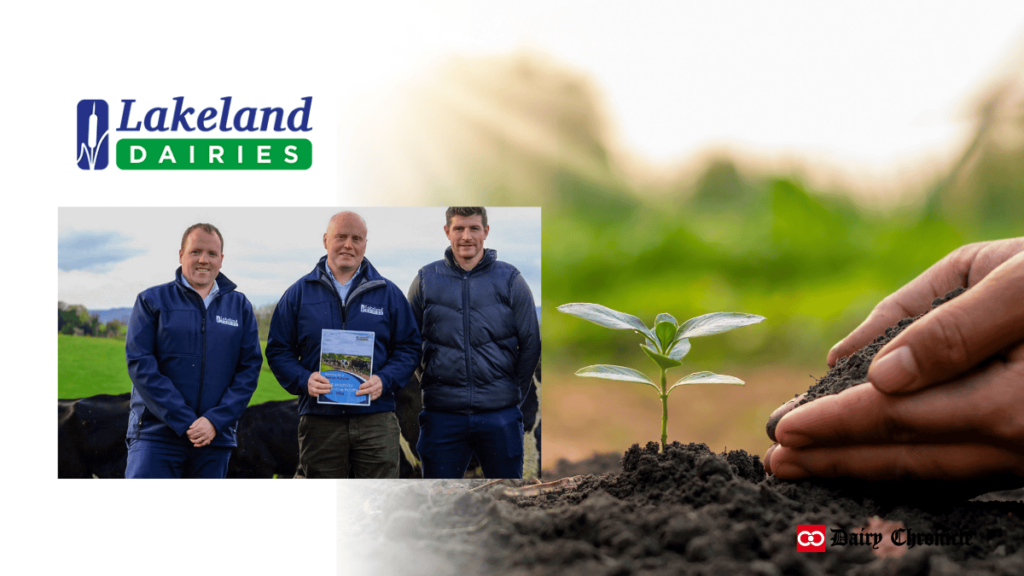Lakeland Dairies is planting 5,000 native trees at its Cavan sites as part of its “Pathway to a Better Future” ESG strategy. This project involves one hectare of tree planting at both the Bailieboro and Killeshandra locations and underscores the co-op’s commitment to environmental sustainability and biodiversity.
Lakeland Dairies, a leading dairy co-op in Ireland, has embarked on a significant environmental initiative by launching a tree planting project at two of its Cavan sites. Known for its commitment to high-quality dairy products and community engagement, Lakeland Dairies is now extending its dedication to sustainability through this new project. This initiative, which involves the planting of native trees, reflects the dairy co-op’s dedication to sustainability and environmental stewardship as part of its ESG strategy, “Pathway to a Better Future.”
Project Details
The initiative involves planting approximately 5,000 native trees across two hectares of land. The trees, including oak and birch, are being planted at Lakeland Dairies’ Bailieboro and Killeshandra sites. Each site will see the planting of one hectare of trees, contributing to the local ecosystem and promoting biodiversity.
Project Schemes and Goals
The tree planting at the Bailieboro site is part of the Native Tree Area (NTA) scheme, while the planting at Killeshandra falls under the Native Woodland Establishment (NWE) scheme. Both schemes are integral components of the National Forestry Programme 2023 – 2027, which aims to enhance Ireland’s forest cover and support ecological health.
- Native Tree Area (NTA) Scheme: The trees planted under this scheme will serve as a demonstration site for the benefits of small-scale native tree planting. This initiative aims to illustrate how such projects can positively impact land use and biodiversity, providing valuable insights and examples for farmers and landowners.
- Native Woodland Establishment (NWE) Scheme: The Killeshandra site will focus on establishing a woodland habitat, reinforcing Lakeland Dairies’ commitment to preserving and promoting native woodlands. This effort is expected to contribute significantly to biodiversity conservation by creating new habitats for various species.
Community and Environmental Impact
The tree planting project is a tribute to the 3,200 farm families and 1,400 staff members of Lakeland Dairies, highlighting the co-op’s appreciation for their contributions and its role in the community. By planting these trees, Lakeland Dairies aims to improve environmental sustainability, enhance local ecosystems, and demonstrate leadership in corporate social responsibility.
Partnership and Purpose
Lakeland Dairies has partnered with Western Forestry Co-op to execute this project. The initiative is a tribute to the dairy co-op’s extensive network, which includes 3,200 farm families and 1,400 staff members. By engaging in this tree planting effort, Lakeland Dairies aims to underscore its dedication to environmental stewardship and support for the community..
Environmental Impact
The tree planting initiative is a key component of Lakeland Dairies’ ESG strategy. The choice of native tree species is intended to enhance local biodiversity and support the region’s ecological balance. This effort aligns with the company’s ongoing commitment to reducing its environmental footprint and fostering sustainable practices.
Future Plans
Lakeland Dairies’ tree planting initiative is part of a broader commitment to environmental sustainability. The company plans to continue exploring and implementing additional projects that contribute to a greener future and support its ESG goals.
Through this initiative, Lakeland Dairies is not only contributing to environmental conservation but also reinforcing its role as a responsible and forward-thinking organisation within the dairy industry.
Lakeland Dairies’ tree planting initiative represents a significant step towards enhancing biodiversity and supporting environmental sustainability in Ireland. By planting 5,000 native trees across two sites and participating in national forestry schemes, the co-op is setting an example of how agricultural organisations can contribute to ecological conservation while engaging with and benefiting their communities.



